Romania’s most important changemakers in environmental and sustainability issues took part in the two-day Environmental & Sustainability Summit hosted by Business Review. As people who are leading sustainable change, the speakers explored all the key aspects of the much-needed #GreenRestart that we are all striving for: from sustainable food and water consumption to eco-communities, renewable energy sources, and the establishment of a circular economy.
By Aurel Dragan
Starting the event, H.E. Ramona Chiriac, Head of the European Commission’s Representation in Bucharest, talked about the fact that decarbonisation and economic growth are closely connected and gave insight into the ways in which the European Commission is tackling the issue. “The von der Leyen Commission’s goal is to set the EU economy on track to achieve a net zero carbon economy by 2050, thus reflecting our joint commitment to achieve the objectives of the Paris Agreement by tackling climate change and biodiversity loss,” said Ramona Chiriac. “An industrial revolution is underway, whether we like it or not. And progress towards decarbonisation and sustainability is part of it. Trends in Europe show continued declining greenhouse gas emissions. Preliminary data translates into a reduction of around 31% compared to 1990, while the EU GDP has grown by 67% over the same period. This confirms the Green Deal’s vision that decarbonisation and economic growth go hand in hand,” the Head of the EC Representation in Bucharest added.
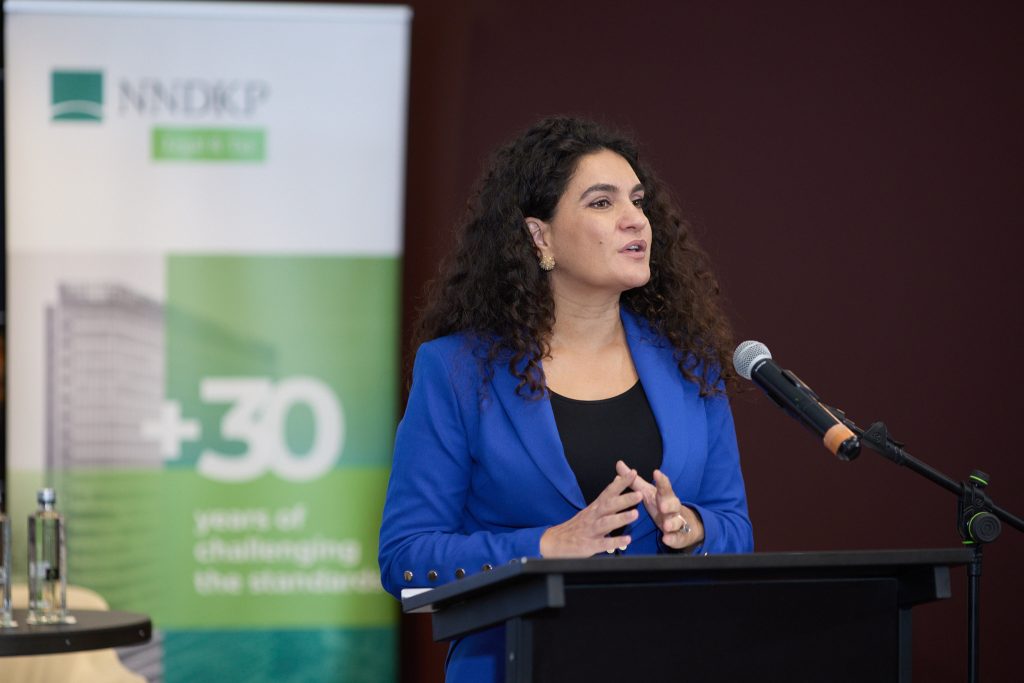
Lara Tassan Zanin, PhD, EMBA, and Head of the European Investment Bank Group Office in Romania, explained that by 2030, the EIB is committed to mobilise an investment of one trillion euros in climate, financing that will go towards all European countries. “In Romania, the EIB Group delivers between 1 and 1.5 billion euros every year. As EU’s Climate Bank, we are committed to lend at least 50% of our lending to green projects starting 2025. In Romania this is a challenging objective as the country still needs basic infrastructure that is not fully green like roads, hospitals, universities. This is why when we finance grey or brown projects we make sure that green solutions are integrated, particularly energy-efficient and resource-efficient technologies.”
Mircea Fechet, the Environment, Forests, and Water Management Minister, talked about the Deposit-Return System (DRS) in Romania. The DRS is a new legislative framework that aims to increase the rate at which packaging waste is recycled the country by 90% until 2035. “The DRS system will reduce waste and contribute to resource conservation. I really care about involving the citizens and letting them know they are the ones who will make the system work, and we expect the DRS to have an efficiency of over 95% three years into its implementation. It will not be easy; it’s an issue we’ve been talking about since 2018, a project I’ve created from scratch and I’m really optimistic about it,” said Mircea Fechet.
Ionut Georgescu, the CEO of FEPRA, highlighted the importance of building a national strategy that is realistic and coherent with the goal. “At FEPRA, we are now managing a project for the IFC (International Financial Corporation), a part of the World Bank, and together we are trying to help the Romanian Government draw up its strategy for the circular economy and make the plan more operational and realistic, as well as explain how to make it work. In Romania we are very good at strategies, but not so good at implementing said strategies, and we have two major problems. The other one is the way our institutions are managed,” he argued.
Sorin Elisei, Consulting Director and Leader of the Sustainability Practice at Deloitte Romania, talked about the difficulty of obtaining financing, with companies increasingly preferring grants instead of loans. “I would say it is extremely difficult and challenging to obtain green financing. Even though projects have now reached technical maturity, they have no financial maturity. In reality, what we’re seeing in the PNRR is that the list of companies that should be signing actual financing contracts are dropping out because they cannot provide the guarantee letter, the remaining amount on top of the grant, and this makes achieving targets at the country level very difficult.”
Concluding the first panel, Eugen Vaida, Executive Director for Romania at The Prince’s Foundation, which, explained that sometimes it is better to save old buildings than build new ones. “We’re seeing very well restored buildings and we say that the most sustainable building is the one that you don’t need to build. This has guided us in recent years, so what we have done is try to save Romanian heritage, reuse it, and give it back to communities. This is why we don’t need to build other buildings, especially since the construction industry is one of the biggest polluters along with the textile and food industries.”
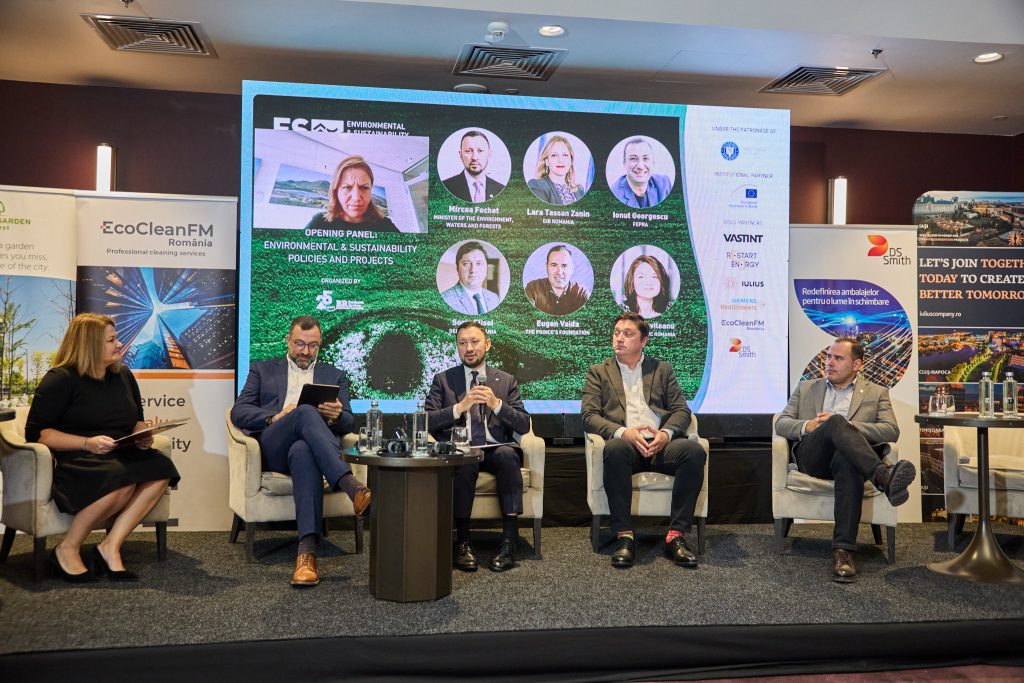
Food and Water
The discussion then moved towards sustainable agriculture and water management. Corina Dospinoiu, Sustainability Director at Auchan Romania, talked about what big retailers must do in order to help farmers to become sustainable. ”For Auchan, sustainable agriculture is a must have. It’s a profound transformational element that we must have at the industry level, because for us, it accounts for 95% of the carbon emissions at the company level, and 75% of that 95% comes from the food area. That’s why the impact of agriculture is so big and it’s imperative that we work with the industry and transform the way we produce food so that we combat climate change.”
Florin Stoica, Sustainability Manager at Carmistin International, spoke about the way an agricultural group should be managed in order to become sustainable and efficient. “Carmistin is an integrated agricultural group and sustainability is the principle that governs all our activities. Food production must be energy efficient and have a low environmental impact. We have established a strategy to become as sustainable as possible and integrate as many elements of the circular economy as possible. The strategy is based on three pillars: the first is the production of green, renewable energy, the second is the efficient use of resources and the elimination of waste, and the third is the acquisition of energy-efficient tools and technology.”
The strategy for the entire agriculture industry was a topic tackled by Florian Ciolacu, Executive Director at the Romanian Farmers’ Club for Performance in Agriculture. “The solution for the agricultural sector in Romania is integrated water and soil management, irrigation and desiccation, precision farming and digital agriculture, advice and consultancy, and investment financing. We know what needs to be done, we know it must be done immediately, but it is a question of managing success, not a lack of it. In Romania, about 5,000 farms work about a third of the total agricultural land and produce three quarters of the country’s total output. These farms are the backbone of Romanian agriculture.”
Iuliu Alin Udriste, General Manager of the National Society of Mineral Waters (SNAM), explained that we need to use more of the available regenerable resources, such as mineral water. “In terms of underground mineral water resources, Romania ranks first in Europe. At SNAM, we have the exploitation licenses and we sell the water to producers. Romania is one of the happiest countries in this regard, with enormous mineral water resources. There are three types of water on shop shelves: mineral, table, and spring water. Mineral and spring water are not allowed to have chemical intervention and must be microbiologically pure at the source. The top four mineral water producers in Romania—or 78% of the total—bottle water sourced from the SNAM.”
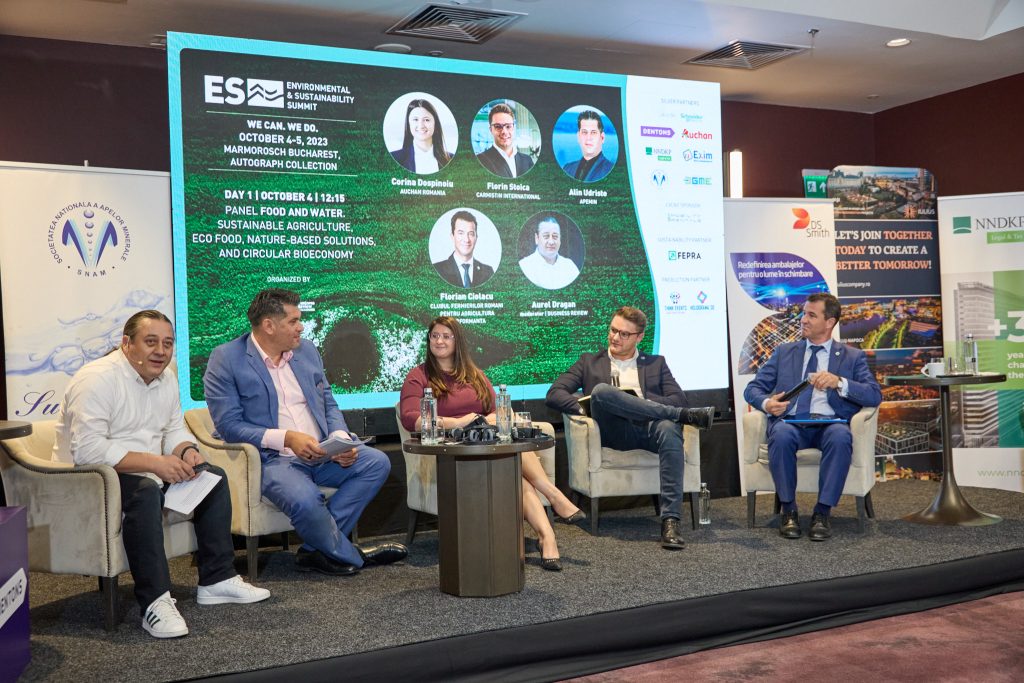
Sustainable Business Development
Dan Adrian Chelaru, Group Sustainability Officer at Iulius, opened the conversation about sustainable urban development. ”It is important to realise that sustainability means responsibility, and that means taking on the challenges facing society and understanding that the way we do our work will affect us all. I come from the real estate sector and I would like to raise a red flag, especially around the construction segment, which needs a change in the way it does business. We need to change our focus from profit to adding value to communities.”
Andreea Ciobanu, Chief Marketing Officer at Hagag Development Europe, explained that Hagag was focusing on urban regeneration projects. ” For us, sustainability in the residential sector, and within our projects, is about buildings that answer to present needs without affecting the needs of future generations. Projects that are designed and built to have as little impact on the environment as possible, that encourage the economic development of the cities they are build in, and that contribute to the development of sustainable communities. When a developer completes and delivers a project, he also lays the foundation of a new community. But Hagag is not just an investor-developer, it also manages the projects it delivers. This is how we make sure that our buildings stay healthy and sustainable over time. We offer Facility Management services for our residential projects as well – which is not something common in Romania.”
Edmund Piess, Sustainability Director at Holcim, talked about the construction industry and its importance in an ever-developing world. “The Holcim Group in Romania doesn’t only produce cement. Concrete is just one end product, but we have a wider range of building materials. As we talk about decarbonisation, we need to first understand what it means. Today, we have a problem with climate change. At the same time there is an imbalance in the atmosphere, we have too much CO2. And for as long as we produce too much CO2, we will see a greenhouse effect. Decarbonisation means finding solutions to stop this overproduction.”
Moving on to the cleaning industry, Mark Thompson, Managing Director at EcoClean FM Romania, argued that technology can provide ways to reduce the use of chemicals. “In the past decade, the cleaning industry has undergone a remarkable transformation, placing great emphasis on sustainability for both consumers and companies. The use of harsh chemicals is no longer desirable, although there are instances where their use remains necessary for the removal of certain substances. Nevertheless, in the majority of cases, water-based methods such as e-water systems and microfibre technology prove to be sufficient for their elimination. Take, for instance, the cleaning of outdoor spaces or fixed infrastructures, which previously required the heavy use of detergents to eradicate stubborn stains. However, thanks to the development of simpler alternatives like pressure washers equipped with task-specific nozzles, these stains can now be removed without the need for chemical.”
Alexandru Vasiliu, Sales and Marketing Director at e-Mobility Rentals, highlighted an innovative urban mobility solution. “EMobility has an innovative solution for urban mobility based on a growing fleet of electric vehicles that run on universal interchangeable batteries, battery swap stations already installed all over Bucharest and a mobile app that connects all of them. The basic idea is that you don’t have to wait for your car to charge, you can easily swap your empty battery with a charged one in less than 1 minute. Our partnerships with Kaufland and Glovo are strong confirmations of the validity of our integrated solution.”
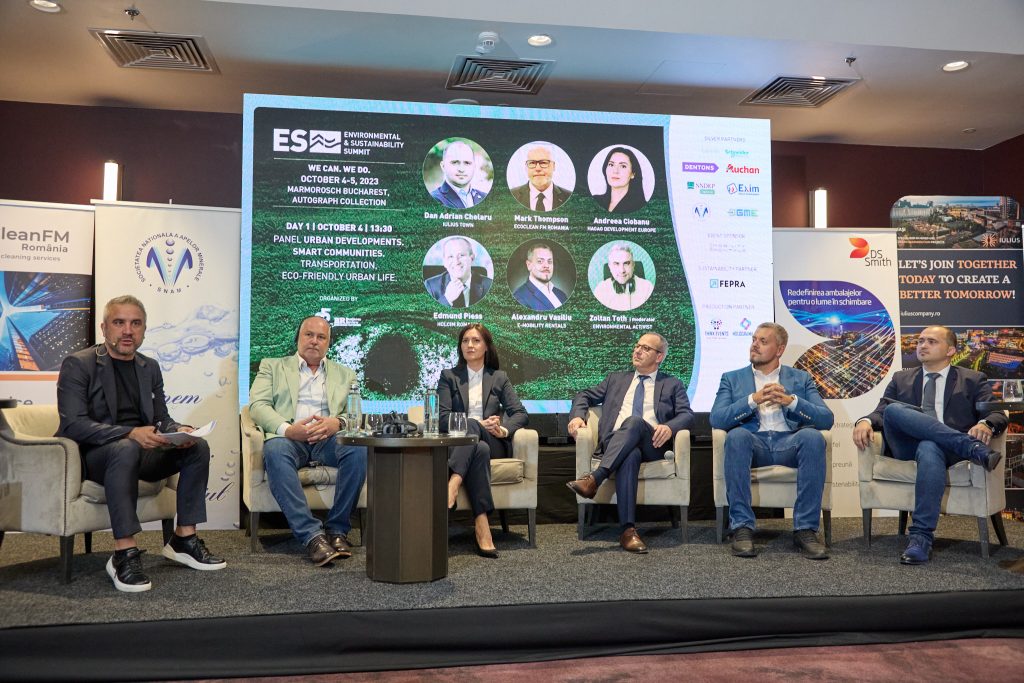
Energy
The second day of the event started with a panel on energy, where we need both strategy and investment. Dan Dragos Dragan, State Secretary at the Energy Ministry, talked about energy poverty and the projects the Ministry is preparing to tackle it. “We are all concerned about energy poverty, which affects us all. The Ministry of Energy’s motto is that no one should be left behind in the energy transition we have undertaken. We have also managed to take good measures quickly and they are starting to bear fruit, and here I am thinking of the implementation of Directive 944 at the end of 2021, which introduced quantitative and financial compensation for consumers. Today, we have reached over 1 gigawatt installed, over 70,000 consumers connected to the grid, and this energy leads to lower prices for other consumers. On the thermal energy side, we have signed contracts worth more than 400 million euros for cogeneration plants for district heating.”
Valentin Bargau, VP of Corporate Operations at Restart Energy, talked about the way the stock market can be used for financing. “In the energy sector, where we still need investment, the capital market is one of the most important financing instruments we have. Unfortunately, in Romania, this instrument has not been used much, but lately we’ve seen more and more companies turning to the capital market, just as Restart Energy has done with its bond issuance. In fact, we are preparing for an IPO next year and we hope that our example will be followed by as many energy players as possible.”
Ecaterina Gheorghe, Energy Expert and Management and Strategic Advisor at General Meel Electric, talked about renewable energy. “The evolution of the renewable energy market over the last 15 years has not been linear. Neither the market nor the infrastructure were ready. In 2008-2010 there was an interest in renewable energy generation, but with construction at a relatively small scale; in 2011-2013 there was a boom due to the support scheme and falling technology costs. With the end of the support scheme, things went into stagnation. Now we are entering a period of market maturity, with interest in self-consumption and PV systems on households having increased significantly. And we will continue because of the targets we have set ourselves as a country in terms of green energy.”
Mioara Iofciulescu, President of Atlantis Romania and Vice-President of OFA UGIR, the moderator of the panel, concluded that there were still plenty of things to be done in the energy sector. “From the perspective of the World Energy Council, the notion of sustainable energy translates into three main elements: energy security, energy equity and sustainable environment. By harmonizing these three elements will obtain the basis of prosperity and competitiveness at the level of each country.”
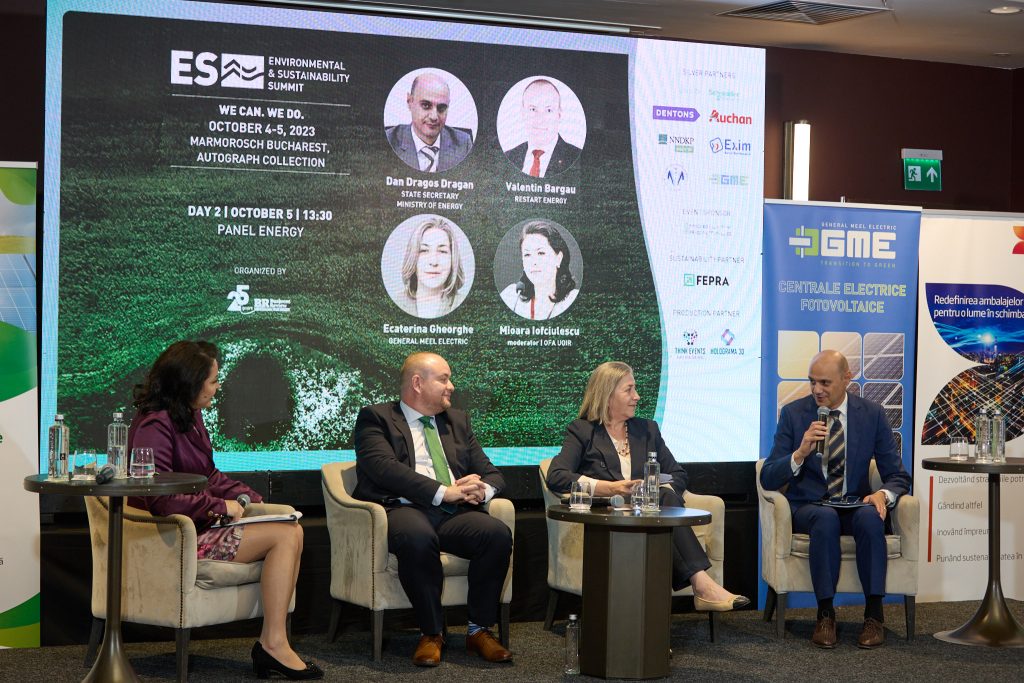
Sustainable Business
Dr Claudia Oanea, Managing Director at Siemens Healthineers Romania, started the panel discussion with some thoughts on digitalization and the use of AI. “Globally, by 2030, 18 million people in the healthcare workforce will be out of the system, which is why we need artificial intelligence. Moreover, life expectancy will increase, so we will need more technology in diagnosis. There are many AI components in our equipment, including remote operations.”
Moving on to packaging, Adrian Botos, Cluster Sales, Marketing & Innovation Manager at DS Smith Packaging Romania, talked about the transition to sustainable business practices. “DS Smith helps customers transition to a sustainable business by optimising the use of packaging along the supply chain. Last year we managed to replace more than eight million pieces of problematic plastic packaging with corrugated, recyclable packaging, through the partnerships we have with customers. The potential for the use of corrugated packaging is very high in Romania for a wide range of products.”
Cristian Popescu, Partner at Dentons, highlighted the momentum of ESG. “In 2010, the British Petroleum oil rig exploded and caused a catastrophe. That was the turning point where investors and business accelerated the creation of this ESG concept. It’s about responsibility—to the environment, to employees, to companies. In the future, other elements may also be included in this concept. It is an evolving concept. Globally, ESG has direct effects on financing and investment.”
Claudiu Bud, Strategic Transactions Director at KRUK Romania, concluded the panel with a point about social responsibility. “The measure of a company’s social responsibility lies beyond generic ESG requirements, sustainability trends or the rough rules of internal governance. Acting effectively with empathy and responsibility towards community and environmental sustainability, showing respect for individuals, and making a real contribution to the well-being of all stakeholders are things that justify a company’s relevance in our daily lives. At KRUK Romania, our social value is at least as important as our market value and we aim to remain the promoters of change, both in the way Romanians relate to debt and in the perception of a company’s role in society.”
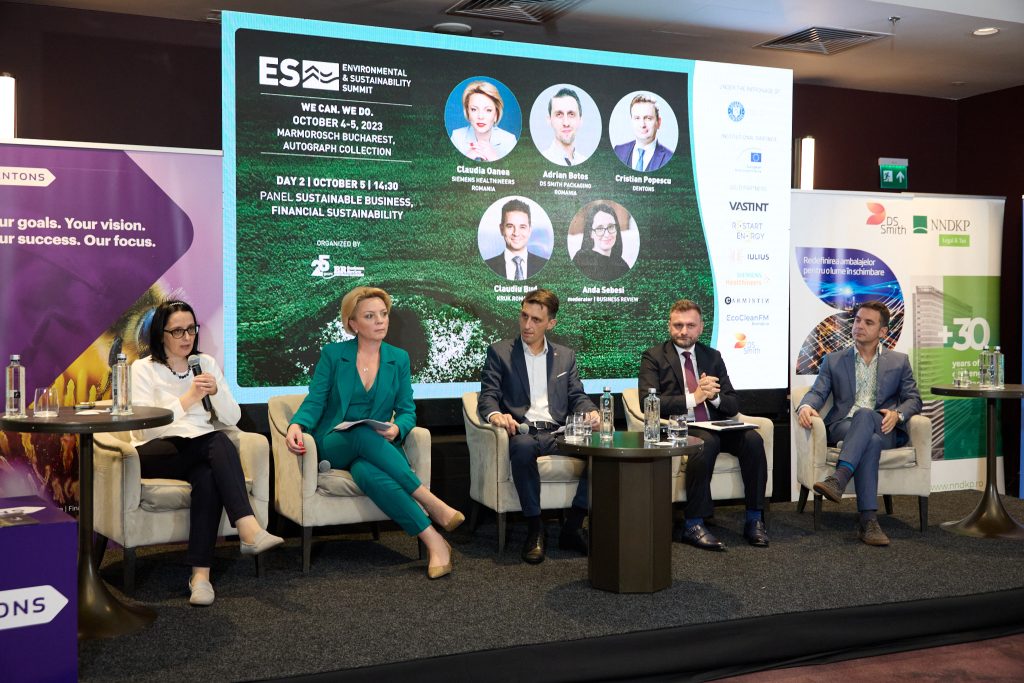
Circular Economy
Cristian Nacu, Senior Country Manager for Romania at the International Finance Corporation, opened the last panel talking about the financing programmes available for Romania. “In the last five years we have provided approximately 2 billion dollars in financing, and our current portfolio is almost 1.8 billion dollars, the largest in Europe, and this is because financing needs in Romania are still significant. So far, we have done green bond, green loan or blue loan financing. More than 75% of the financing fell into the categories of green or sustainable financing.”
Madalina Vasile, Managing Associate at NNDKP, argued that everybody needs to get involved for the circular economy to succeed. “At the European level we have an action plan on the circular economy side, with a new plan that was adopted in 2020. But the transition must not only be done on paper, but in practice as well, and we also need clear regulations from the authorities, active involvement from companies, and participation from consumers.”
Anca Marinescu, Corporate Affairs & PR Manager at RetuRO, talked about the next important programme that will soon come into force. “The Guarantee-Return System is important for the traceability of the raw material. The system is circular in itself, as it returns the raw material to the economy. It is complex to implement, a huge logistical effort, especially because of the fact that Romania is a large country with a varied geography. And it will be fully integrated, meaning it will include producers and distributors, the authorities, and consumers. We must all participate in order for the implementation of this system to be successful.”
Irina Siminenco, Corporate Affairs Manager at Nestlé Romania, talked about education in the Guarantee-Return System. “It is the manufacturer’s job to ensure that the packaging of a product is recyclable. This is the first step. Then, it must be taken somewhere to be recycled, which requires dedicated infrastructure. But there is also an educational component; even if the manufacturer did his job and made the packaging recyclable, and the authorities did provide the separate collection infrastructure, it is the consumer’s decision to take the packaging to the respective bin. At Nestle, we have invested over two billion euros in the packaging recovery system and the use of recycled plastic in future packaging, and in Romania we are also involved in education: we’ve even visited to kindergartens to explain what packaging is and why it should be recycled.”
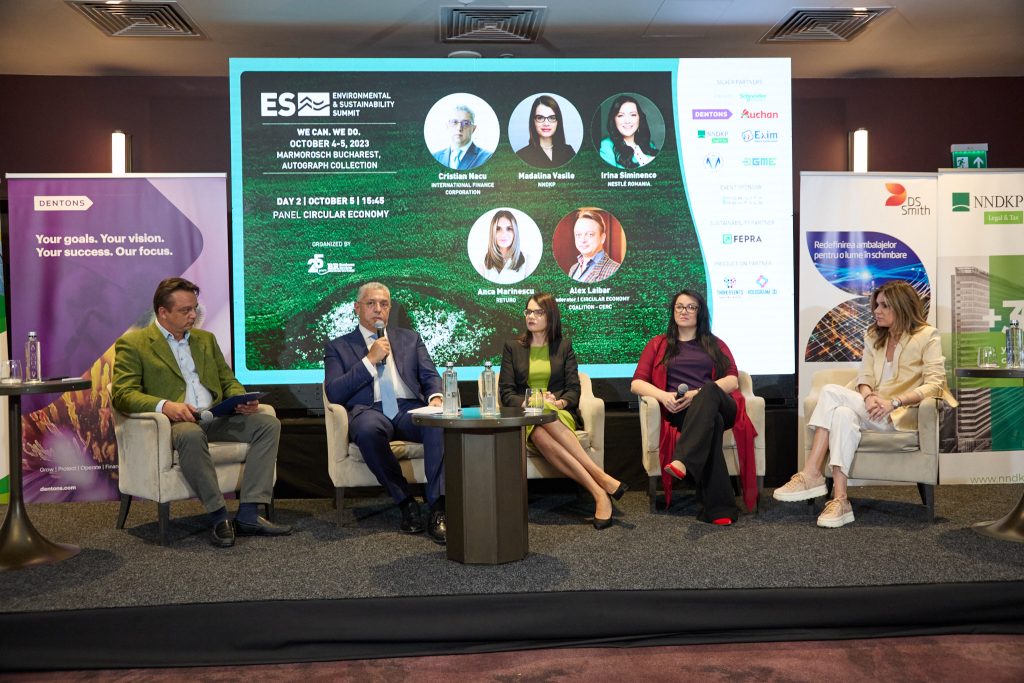


:quality(80)/business-review.eu/wp-content/uploads/2023/11/ESS2-1.jpg)

:quality(80)/business-review.eu/wp-content/uploads/2024/06/dreamstime_smart-city-scaled.jpg)



:quality(80)/business-review.eu/wp-content/uploads/2024/06/22C0420_006.jpg)

:quality(80)/business-review.eu/wp-content/uploads/2024/06/COVER-1-4.jpg)



:quality(50)/business-review.eu/wp-content/uploads/2024/05/DSC05115-scaled.jpg)
:quality(50)/business-review.eu/wp-content/uploads/2024/05/NL_PANEL-1.jpg)
:quality(50)/business-review.eu/wp-content/uploads/2024/05/SNIPPETS_vasiliu.jpg)
:quality(80)/business-review.eu/wp-content/uploads/2024/06/br-june-2.jpg)
:quality(50)/business-review.eu/wp-content/uploads/2024/07/VGP-Park-Timisoara_-8thbuilding_iulie-24.jpg)
:quality(50)/business-review.eu/wp-content/uploads/2024/07/America-House-Offices-Bucharest-Fortim-Trusted-Advisors.jpg)
:quality(50)/business-review.eu/wp-content/uploads/2024/07/BeFunky-collage-33-scaled.jpg)